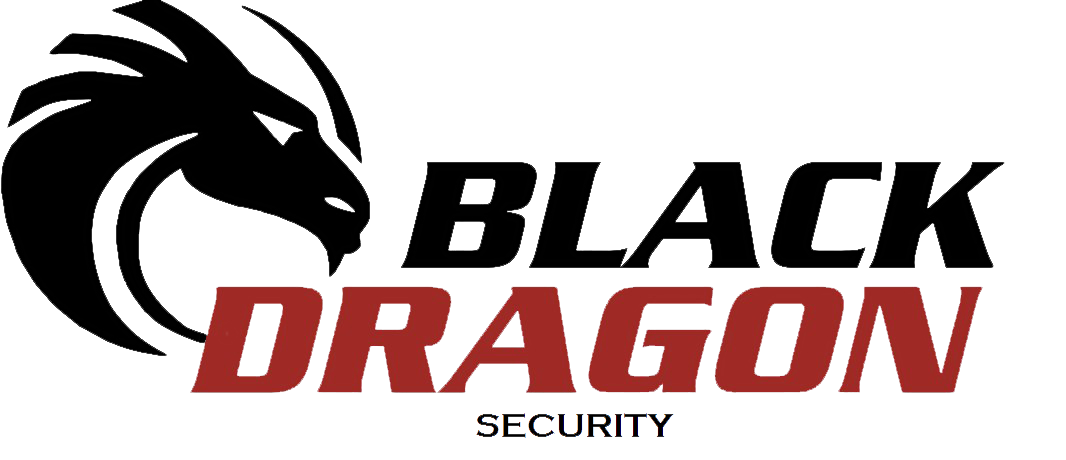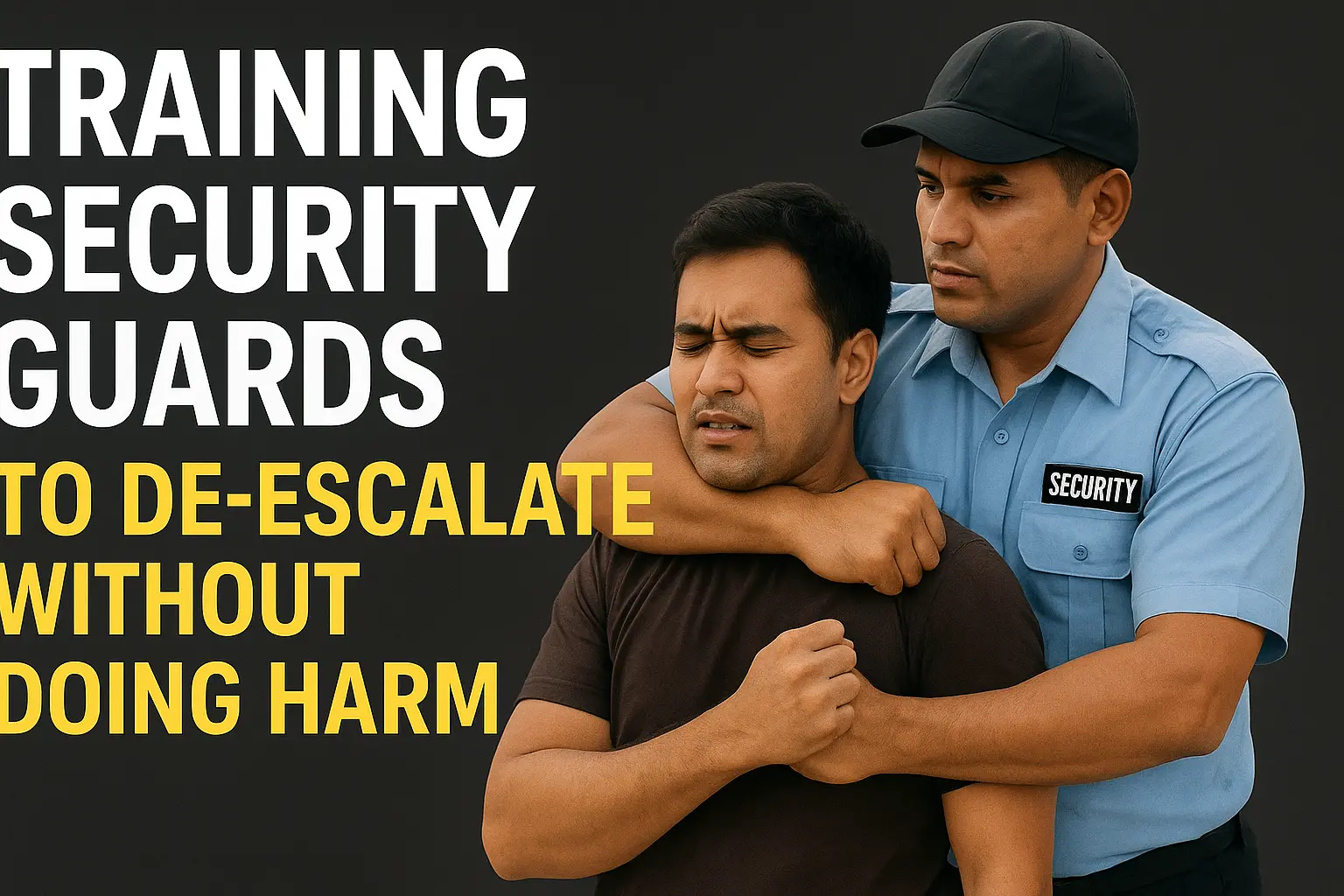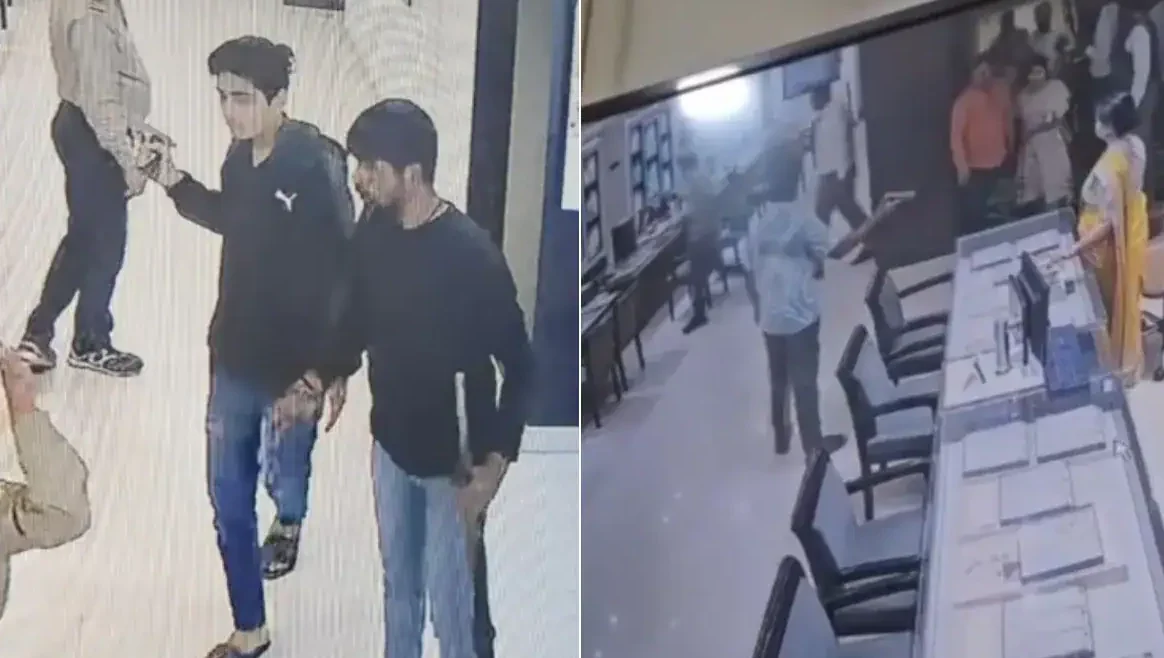Opening: A Moment That Could Have Gone Another Way
In the early hours of Monday, August 18, 2025, a domestic dispute in Noida’s Antriksh Kanball Society turned brutally violent—not at the hands of a partner alone, but with the “protectors” tipping the situation into retaliation. This incident underscores the critical need for security guard restraint training without injury. The episode swiftly spread across social feeds and led to arrests, spotlighting a painful truth: when security staff lack proper training in de-escalation and restraint, attempts to protect can backfire disastrously. The Times of India
The Incident in Brief
Harsh was allegedly beating his wife when she cried for help. Four security guards rushed to the ninth floor and confronted him. What began as intervention spiraled: Harsh slapped one guard, triggering a violent response. The guards dragged him out, wielding sticks —resulting in serious injuries, including a head wound requiring stitches. Subsequently, all four were arrested when the couple filed a complaint. The Times of India+1
Why This Case Matters
- Guardian turned aggressor. Security guards, meant as protectors, became perpetrators.
- Response without restraint. Faced with aggression, guards hit back with blunt force rather than physical-control techniques.
- Legal and reputational repercussions. Rather than hailed as heroes, they faced criminal charges, undermining trust in residential security.
This is more than a cautionary tale about overreach. It’s an indictment of the systemic gap in training—one that leaves security personnel unequipped to neutralize violence without escalating it.
What Went Wrong: When Training Doesn’t Go Far Enough
- No graduated approach. The guards defaulted to weapons (sticks, rods), rather than trying minimal force first.
- No non-injurious control methods. No arm holds, joint locks, grappling, or other physically restrained techniques were attempted.
- No improvisation using everyday materials. Tools like scarves or zip-ties were evidently not considered or available.
- No de-escalation protocols. Communication, verbal commands, or calming tactics may have been absent or ineffective.
The Better Way: Restraint Through Technique, Not Trauma
Learned from disciplines like judo, krav maga, and law-enforcement safe-control, proper physical restraint is less about force and more about control. Here’s how:
1. Arm Holds and Joint Locks
Techniques such as wrist turn-locks, elbow locks, or armbars enable a security person to immobilize an aggressor by bending or controlling a joint, limiting motion without causing damage. The key lies in leverage—not strength.
2. Body Grappling and Leverage Holds
Using weight distribution and hip alignment (common in judo), one can pin someone to the ground or neutralize movement while minimizing harm. These moves rely on technique rather than aggression.
3. Submission Maneuvers
Moves like a “clothesline hold” (wrapped arm behind the neck, controlled takedown) or side control transitions give control zones while protecting both parties.
4. Improvised Restraints
In residential settings where zip-ties or commercial flex-cuffs aren’t standard, guards can use:
- Scarves or chunni: looped and tightened around wrists or arms (with care, to avoid cutting circulation).
- Inner-wear cloth strips or belts (from the security uniform): used as soft ties.
These allow fast immobilization until police arrive—without bruises or broken bones.
5. Verbal and Visual De-escalation
Calm commands (“Stop. I need you to release.”), controlled voice tone, and non-threatening body language can diffuse aggression in many cases before physical control is needed.
Why Proper Training Makes All the Difference
- Reduces injury risk—to both aggressor and guard.
- Minimizes legal liability—less likely to be charged with assault.
- Preserves authority—guards seen as professional, not vigilante.
- Builds trust—residents and management appreciate measured response.
Training Recommendations for Security Agencies
- Mandatory physical-control certification
Curriculum drawn from judo, krav maga, Haryagata holds—customized for security contexts in housing complexes. - Quarterly drills and scenario training
Role-playing: domestic violence calls, drunk disturbances, gate-entry fights. Use mannequins or volunteers to simulate resistance. - Issuing safe restraint gear
Soft zip ties, duct-tape, or cloth restraints—with training on safe application and removal. - Verbal de-escalation modules
Communication strategies, tone awareness, conflict resolution. - Legal awareness sessions
What constitutes excessive force, what’s legally permissible—so guards know boundaries. - Clear escalation protocols
Step-by-step:
- Assess
- Verbal warning
- Physical control (hands)
- Improvised restraint (cloth/ties)
- Weapons only if intense threat—training emphasis on stopping before step 5.
Imagining a Different Outcome
Had these guards been trained:
- The wife’s cries would still have triggered action.
- On the 9th floor, instead of grabbing rods, one guard could have calmly engaged Harsh verbally.
- When slapped, another could’ve moved in with a wrist turn-and-arm lock, immobilizing Harsh without harm.
- A scarf or belt could have secured his hands behind his back, holding him in position for police.
- No injuries. No arrests. Averted chaos.
Tying It All Together
The Noida case isn’t just an alarming headline—it’s a statement: without proper training in restraint and de-escalation, security staff risk harming those they aim to protect—and themselves. It’s high time housing societies and security firms recognize that strength isn’t the absence of training—it’s the mastery of restraint.
By investing in structured, humane, and effective intervention techniques—from arm holds to scarves—we build safer societies, protect legitimacy, and ensure security doesn’t become scandal.





